
“I think you ought to know what our chances are. The life of everyone aboard depends on just one thing: finding someone who can not only fly this plane, but who didn’t have fish for dinner.”
Director: Hall Bartlett
Starring: Dana Andrews, Linda Darnell, Sterling Hayden, Peggy King, Geoffrey Toone, Charles Quinlivan, Elroy “Crazylegs” Hirsch, Raymond Ferrell, Jerry Paris, Steve London
Screenplay: Arthur Hailey, Hall Bartlett and John Champion, based upon a story by Arthur Hailey
Synopsis: In the dying days of World War II, Flight Lieutenant Ted Stryker (Dana Andrews) of the Royal Canadian Air Force leads a disastrous mission over Germany, which leaves Striker himself seriously injured and six of his men dead. Examining Stryker at a military hospital in Scotland, his doctor finds that his physical injuries have healed, but expresses grave concern over Stryker’s state of mind… Eleven years later, Stryker applies for a job at a Winnipeg-based aeronautical research company. When his potential employer, Frank Graham (Roy Gordon), shows reluctance, Stryker comments bitterly that he knows his war record is against him. Graham retorts that it is his record since the war that is against him: a series of jobs, all of them beneath his abilities, and a persistent refusal to accept responsibility. Stryker pleads with Graham, promising that things will be different this time, and Graham agrees to see what he can do. Buoyed by this outcome, Stryker heads for home, where to his bemusement he finds neither his wife, Ellen (Linda Darnell), nor their young son, Joey (Raymond Ferrell). He does, however, find Ellen’s note… Stryker arrives at the airport as Ellen and Joey are boarding their flight on the tarmac. He calls out to them, but they cannot hear him over the engines. Stryker dashes back into the terminal to purchase a ticket and boards just before the doors are closed. The stewardess, Janet Turner (Peggy King), shows him to the last vacant seat. During the take-off, Stryker is almost overcome by panic. As soon as he can, he hurries to the bathroom, where his memories overcome him… Recovering himself, Stryker approaches Ellen, who is dismayed to see him and resists his plea to talk. Stryker takes Joey to see the cockpit, where he is welcomed by Captain Bill Wilson (Elroy Hirsch) and his co-pilot, Walt Stewart (Steve London). While they are there, Janet comes in to take the dinner orders. Both pilots choose fish, as does Joey, while Stryker asks for the lamb chops. Wilson gets a weather report, learning that bad weather has closed the airports near the Rockies, and that Vancouver is experiencing thick fog. Stryker makes his way back to Ellen, pleading with her for another chance. She speaks sadly of his inability to find himself since the war, the constant moving from job to job, and the widening distance between the two of them; concluding wearily that she can no longer live with a man she doesn’t respect… Later, as Janet begins to remove the dinner trays, one of the passengers complains of illness. Janet is puzzled by the severity of the woman’s symptoms, and reports to the captain. Wilson advises her to see if there is a doctor on board, but warns her not to alarm the other passengers. Janet manages to locate a Dr Baird (Geoffrey Toone) and asks his help. At that moment, Stryker tells Janet that Joey is sick; Baird promises to see him, too. After examining the two, Baird insists on speaking to the captain, and asks how soon they can land. Wilson tells him that they have passed the point of no return, and that because of the weather they will have to push on to Vancouver, almost four hours away. Suddenly, the plane lurches violently. Staggering to the cockpit, Wilson and Baird find Stewart slumped over the controls. Wilson regains control of the plane as Baird examines Stewart. Questioning Janet, Baird learns that all of the sick passengers had fish for dinner. Baird begins to issue orders for arranging medical assistance at Vancouver, but Wilson interrupts with grim news: he had fish for dinner too…
Comments: On behalf of reviewers everywhere, I’d just like to say that in my opinion, there are some jobs that reviewers just shouldn’t be asked to do – reviewing a film that’s been MSTied, for one. Or at least, if you do ask that of us, don’t complain afterwards that you’ve heard it all before: it’s not our fault all the good jokes are taken. Or how about asking us to tackle the Substance DVD release of the Turkish Exorcist rip-off Seytan, without getting completely distracted by the fact that the subtitles are subtitled? (In this reviewer’s case – EPIC FAIL.) And then there’s the big one: in this day and age, in this pop cultural climate – at this hour – asking us to write a straightfaced review of the 1957 disaster movie Zero Hour!
Surely you can’t be serious?

Yes, indeed: as all the world and his aunt knows by now, Zero Hour! was the basis of one of the most successful movies spoofs of all time, Airplane! – or, as it is known in this neck of the woods (us not having “airplanes”), Flying High! It isn’t enough to say that Flying High! makes reference to Zero Hour! – in reality, it’s almost as much as a moment-by-moment remake of its model as Gus Van Zant’s version of Psycho…only a lot more successful, of course, if perhaps slightly less funny.
Now— I want to be perfectly clear about something here, right at the outset, chiefly because I doubt my ability to stick to any of the good resolutions I’ve made over the course of this review: Zero Hour! is a perfectly respectable little disaster movie. Yes, certainly it’s melodramatic, occasionally to the extent of going over the top; but by disaster movie standards, it’s almost restrained. It’s a professional work with a quality cast that moves briskly through its story with barely an unnecessary or a wasted scene. It is, in short, in no way whatsoever deserving of the treatment it was later subjected to, and certainly not deserving of its ultimate fate: reducing anyone who watches it today to helpless, involuntary giggles with almost every line of dialogue.
And you know what the crowning injustice is? When Jim Abrahams and the Zuckers (ZAZ for convenience) looked around in the 1970s at what Irwin Allen had wrought and decided that the disaster movie was a fitting subject for parody, it wasn’t Zero Hour! they intended for their target, but rather the very first modern disaster movie, The High And The Mighty: a much more deserving victim in every way. Not only does it take itself far too seriously for its own good, but in stark contrast to Zero Hour!, which runs a mere eighty-one minutes, The High And The Mighty drags on well over the two hour mark thanks to its determination to give almost everyone in the cast a Big, Emotional Scene.
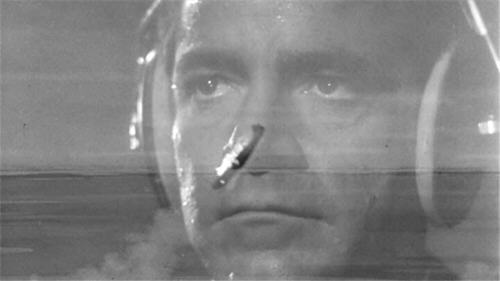
“Lots of people made plans before the war. Like George Zip.”
Indeed, the one aspect of Flying High! that isn’t copied from Zero Hour! is its inclusion of a string of ridiculous scenes with the passengers. Zero Hour!, except for a couple of fleeting moments that we will certainly deal with presently, gives its passengers surprisingly short shrift; it is The High And The Mighty we must thank for, “Jim never vomits at home!”
However, as things turned out, ZAZ were unable to get access to The High And The Mighty: the film was mired in a legal tangle over rights issues that kept it out of circulation for literally decades, and that were only just resolved a few years ago, allowing its release on DVD. But even if that hadn’t been the case, I doubt that ZAZ would have gotten their hands on it: I can’t quite picture the Duke’s estate allowing one of his films to be treated with the indignity intended. But anyway, thwarted in their first thoughts, ZAZ displayed a certain pragmatism (not to mention a mindset rather close to this reviewer’s own) by simply moving on to the next disaster movie on the chronological list – which happened to be Zero Hour!
Zero Hour! is a film with a fascinating history. It actually started life a few years earlier, when Arthur Hailey penned a teleplay called Flight Into Danger, which he sold for $600 to the then-struggling Canadian Broadcasting Company for its live drama General Motors Theatre show. Hailey was born and grew up in England, serving in the RAF during the war, after which he emigrated to Canada and spent about ten years trying to establish himself as a commercial writer.
Flight Into Danger tells the story of a chartered flight between Winnipeg and Vancouver that goes horribly wrong when, thanks to weather delays and the consequent need for a replacement caterer, many of the passengers and both of the flight crew are stricken with food poisoning.

“It’s an entirely different kind of flying – altogether!”
“It’s an entirely different kind of flying!”
The day is saved when another passenger, a truck salesman named George Spencer, who flew single-engine fighters during WWII, gamely takes over control of the commercial airliner and, with the verbal assistance of airline expert Captain Martin Treleaven, who coaches him over the radio, manages to land the plane.
Flight Into Danger was staged as a live broadcast on CBC in April of 1956, and was a huge success; a kinescope copy of the show was broadcast in England on the BBC soon afterwards, and was a smashing success there, too. The telefilm has since become something of a Holy Grail for many of us, not only because of its place in the history of the aeroplane disaster movie (and the aeroplane disaster movie parody), but because that original version of the now venerable story starred as reluctant hero George Spencer none other than James Doohan. Sadly, however, despite considerable efforts, I have found no evidence to suggest that any copies of that kinescope print of Flight Into Danger are still in existence.
(I keep saying that in the hope that SOMEONE WILL CONTRADICT ME. Alas, it hasn’t happened yet.)
The success of Flight Into Danger had a number of consequences. First, Arthur Hailey secured a contract to novelise his teleplay, which he did in collaboration with “John Castle”, the pseudonym for writers Ronald Payne and John Garrod, best known for their semi-biographical novel The Password Is Courage. The novelisation of the teleplay was published in America as Runway Zero-Eight, and in the rest of the world under its original title.
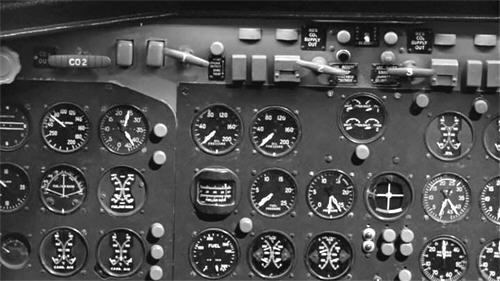
“Speed, 520 knots…course 0-9-0…trim…mix…wash…soak…rinse…spin…”
Second, Hailey sold the rights to his script for use in both the US and the UK. In the former case, it was re-used almost immediately as part of the live broadcast Alcoa Hour program, with Macdonald Carey taking the part of George Spencer; in the latter, Canadian producer Sydney Newman took it to England where it was re-filmed in 1962 as part of the Studio 4 series on the BBC. (Newman is an important figure in the histories of both Canadian and British broadcasting and was, among many other things, one of the prime movers behind both Dr Who and The Avengers.)
And third, after the Alcoa Hour broadcast also proved immensely popular with viewers, the American rights to Arthur Hailey’s teleplay were bought by independent producers Hall Bartlett and John Champion, who brokered a deal with Paramount to turn Flight Into Danger into a feature-length film for theatrical release.
Hall Bartlett’s own career is worth more than a passing glance. Although he devoted much of it to important, socially conscious works, both documentary and feature film, it is (unfairly, but probably inevitably) the other aspects of his output for which he is best known. Bartlett made the first film about American football in Crazylegs, a pseudo-documentary about the career of Elroy “Crazylegs” Hirsch, which starred Hirsch as himself, secured the cooperation and participation of the Los Angeles Rams, and won an Academy Award nomination for its editing, a clever intercutting of new material and newsreel footage.
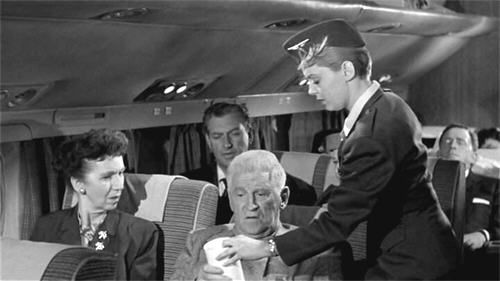
“Jim never vomits at home!”
Bartlett and Hirsch became good friends, and in 1955 Bartlett cast him as the lead in his drama set and partially filmed in Chino Prison, Unchained – from whence “The ‘Unchained’ Melody” – before giving him a part in Zero Hour! Hirsch is a likeable screen presence, but he didn’t think much of himself as an actor, and pretty much gave it away after that, apart from a few guest spots “as himself”, including on an episode of The Munsters. As for Hall Bartlett, he would eventually go on to win a slice of B-Movie infamy by helming Jonathan Livingston Seagull.
Adapting Flight Into Danger for the big screen, Hall Bartlett and his partner John Champion were faced with a few challenges, including stretching a teleplay for an hour-long TV broadcast out to feature length. This is the real importance of the novelisation of Flight Into Danger: although the teleplay itself no longer exists, we know what was in it because of the book. From it we learn that originally, it was simply a matter of George Spencer, not having flown for ten years, and then only single-engine planes, having to land the commercial airliner. There is no traumatic war experience, no ongoing psychological block, and no marriage on the rocks. All of that was invented for Zero Hour! – and it is precisely what makes it a “disaster movie” rather than merely a “drama”.
Apart from those add-ons, Zero Hour! stays remarkably close to its source – which today is the root of the problem. Flying High! plunders its model without scruple, lifting scenes in their entirety and then exaggerating them, giving them a punchline and/or having something stupid going on in the background. Most of Zero Hour!’s dialogue comes directly from Arthur Hailey’s original teleplay; consequently, so does most of Flying High!’s dialogue. This includes many of the now-kneejerk quotes: “It’s an entirely different kind of flying – altogether!”, “You’ll have to talk him right down to the ground!”, “Looks like I picked the wrong week to quit smoking!” and the aforementioned, “—and who didn’t have fish for dinner!” (“Surely you can’t be serious!” is about the only “line” that doesn’t have an identifiable forerunner.)

“Joey…do you like movies about gladiators?”
One of the cleverest aspects of Flying High! is the way that Zero Hour!’s dialogue is redistributed amongst the re-tooled characters: it’s an amusing exercise to take note of who now says what, and when. In the end, the two films share so much that, with Flying High! embedded today so deeply in the collective consciousness, it is simply impossible to watch Zero Hour! without laughing. I tried, I really did; but with the best will in the world I was unable to stop myself reciting much of the dialogue, waiting for punchlines that weren’t there, and giggling inanely at what were intended to be – and probably were, in 1957 – any number of serious moments.
(Mind you— It is precisely because it stayed so close to its model – which, as I have said, is an entirely professional work – that Flying High! worked so well, and still works all these years later. It is because it works as a film that it works as a spoof. You only have to contrast it to the inexplicable, formless garbage that passes for “parody” these days to see what I mean.)
As for the rest of it, there are, I think, only two performances in Zero Hour! that actually warranted the Flying High! treatment (or three, if you want to count Raymond Ferrell’s as the Strykers’ nauseatingly “cute” kid; but probably that’s just me). The first is that of Geoffrey Toone as Dr Baird. It’s not bad, as such, but there’s a breathy pomposity to Toone’s delivery that cries out for ridicule – which it got.
This is, of course, the role taken by Leslie Nielsen, who had paid his own disaster movie dues by then (and would again). Apart from being Canadian, Nielsen is just the same physical type as Toone, which makes it a nicely apt piece of casting. Nevertheless, I hold to my opinion that it was his hilariously “serious” performance in William Girdler’s Day Of The Animals that got him hired by the Zuckers.
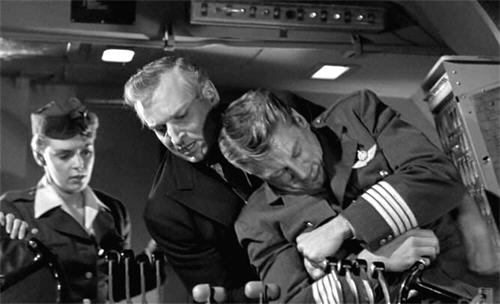
“…until finally the poor bastard is reduced to a quivering, wasted piece of jelly…”
The other performance of note, the only one in the film that really begs for a parodic smackdown, is Sterling Hayden’s as Martin Treleaven. With his clenched teeth, extruding veins and nostril-snorting intensity, Hayden is the one feature of Zero Hour! that approaches what we might think of as “typical disaster movie stuff”. Watching this, you understand why Stanley Kubrick cast him as Jack D. Ripper. Robert Stack’s performance in Flying High! is barely even an exaggeration.
Conversely, the one place where Flying High! moves away from its model is in casting Lloyd Bridges as Steve McCroskey. Zero Hour!’s operations manager, Harry Burdick, played by Charles Quinlivan, is quite a young man, although he certainly steps up when the disaster strikes, even taking on the unenviable task of trying to keep Martin Treleaven within bounds. You can understand why ZAZ went for the much older Bridges, though–for one thing, he spent the early part of the decade in the TV series San Francisco International Airport, and brought those memories with him. However, I suspect the main reason for his casting was his vintage. Bridges came, more or less, from the same era that produced Leslie Nielsen, Peter Graves Robert Stack and Kenneth Tobey; a time when leading men were two-dimensional, habitually humourless, and very often outright dull. (Nielsen’s performance in Forbidden Planet is probably the definitive example.)
Indeed, the only place beyond the 1950s where you can regularly see that sort of acting is in the disaster movies of the 1970s – as ZAZ clearly realised. The triumph of Flying High! is the stroke of genius that saw these vintage actors instructed to act exactly as they would have done in the 1950s – exactly as they would have done in Zero Hour!, for example; as Dana Andrews does – while being surrounded by random lunacy to which they pay no attention at all. Hilarity, indeed, ensued.

“…but the other two pilots are just fine. They’re at the controls, flying the plane; free to pursue a life of religious fulfilment…”
(It seems, however, that Lloyd Bridges himself didn’t quite understand what ZAZ were aiming for: in the chaotic early production days of Flying High!, he nervously asked Robert Stack whether he thought the film would work, and whether people would get the joke? Stack, evidently a little more cluey than his co-star, replied drily, “Lloyd, we are the joke.”)
So – after all that – Zero Hour! The film opens close to the end of WWII, but not close enough for Ted Stryker and his men, flying a mission over Germany through impenetrable fog. Leading the mission, Stryker makes the decision to press to the target, but a miscalculation takes the squadron fatally close to the ground…
Recovering in a military hospital in Edinburgh, Stryker faces a tribunal and takes the full blame for the incident. His doctor, examining him, declares his physical injuries healed, but warns him that he cannot go on as he has been, seeing and talking to no-one, but brooding on his tragic error in solitude. He tells Stryker bluntly that he must face his mistake and get past it: “You can’t run away forever.”
You sure can try, though.
Eleven years later, a desperate Stryker applies for a job with Mid-Canadian Aircraft Co., which is contracted for classified government work. Frank Graham, the manager, hesitates over Stryker’s application, leading him to say bitterly, “My war record again?” “You’re the only one keeping that alive,” responds Graham, pointing at Stryker’s post-war record of moving from job to job and city to city, and refusing to accept any responsibility. Stryker pleads with him, promising that it will be different this time, and making fleeting reference to the state of his marriage; and Graham finally agrees to do his best for him.

They’re on instruments.
Cheered, Stryker shops for some celebratory items, including champagne, and heads for home, where he expects to find his wife, Ellen, and their young son, Joey. He finds neither. He does a find a note on the piano, which he glances at and crushes in his hand… It is a mark of Zero Hour!’s maturity that it starts with something as drastic as Ellen taking Joey and walking out on her marriage. However, divorce was still a hot-button issue under the Production Code – I know of only one 50s film with the nerve to suggest that divorce is sometimes the sensible thing to do – so we can be pretty sure that by the end of the story, Ted and Ellen will be back together.
The estranged couple reuniting has since become an extremely tiresome disaster movie cliché, but it works well here thanks to some solid writing and acting, particularly from Linda Darnell as Ellen. When Ted finally forces a confrontation, she makes it painfully plain that she is leaving him for Joey’s sake even more than her own: that the boy needs stability in his life and that, given Ted’s long record of erratic behaviour, he is better off without his father. Ellen gets a very familiar speech here, and in the course of it expresses her long-held, now-dead hope that one day, “You’d make a stand for Joey and me.” It is with infinite weariness of spirit that she tells Ted that it’s over: “I can’t live with a man I don’t respect.”
Now, let’s see, what else is going on? Well, we’ve got Joey’s visit to the cockpit, and his gee-whiz reaction to it; the weather report, indicating that it’s bad all the way through, with fog over Vancouver; the dinner orders, with a choice between grilled halibut and lamb chops; and some visiting with the passengers. One brief subplot deals with stewardess Janet Turner and Tony Decker, the entertainer boyfriend she can’t quite get to the altar. He’s on his way to Seattle to take up a nightclub gig: a job I sincerely hope doesn’t involve the schtick we see here, involving an Irish glove-puppet named Paddy, with whom Tony entertains Joey Stryker. (I’m going to assume that Paddy is a good luck charm from his early days.) Most of Janet’s role here later goes to Julie Hagerty’s Elaine Dickinson, of course, but there are also echoes of it in Lorna Patterson’s rather sweet performance as Randy, particularly Janet’s marital frustrations. (“Oh, Dr Rumack, I’m scared! I’ve never been so scared! AND I’M TWENTY-SIX AND I’M NOT MARRIED!!”)
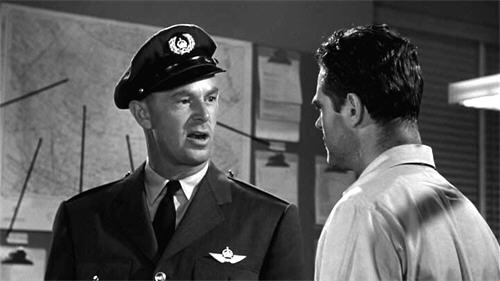
“Route him into Lake Michigan! At least it’ll avoid killing innocent people!”
Otherwise, we also have a trio of football fans, drinking scotch from paper cups and anticipating “the big game”. In Flight Into Danger, most of the passengers onboard are football fans, who chartered the flight in the first place, with the few extra seats being sold off to other travellers – which increases the oddity of the fact that the nature of the game in question is never revealed. I did suppose it was Canadian gridiron – the one with the crazy rules, right? – although in the book, one of the fans is an English ex-pat, which also made me wonder if it was soccer. So, anyone? In late-50s Canada, what would the word “football” imply?
There’s also a nice little scene here between Ted and Joey, the latter asking all sorts of awkward questions, as kids do, like why his father doesn’t fly any more, and why he and his mother were going away without Ted? Also as kids do, Joey has picked up the vibe between his parents, and is not the least convinced by Ted’s explanation of a last-minute change of plans. “I thought I was never going to see you again,” he confides.
While Ted and Joey were visiting the cockpit, Janet came in with the offer of fish or meat for dinner – dum, dum, duummm. (I must say, I’ve always found it hard to believe that a normal kid would pick grilled halibut over lamb chops.) Janet has barely finished serving the dinners – which took a long longer to prepare back then, of course, what with proper crockery and oven-heating – when things start to go wrong.
One female passenger (unnamed, but played by Maxine Cooper) calls for Janet’s help: she’s not just airsick, but in pain and running a fever. Janet gives her some Dramamine, but she’s puzzled, and reports in to Wilson, who advises her, as quietly as she can, to see if there’s a doctor on board. There is, and a brief examination of the woman is enough to tell Dr Baird that the trouble is serious. He tells Janet to get the Captain, then stops to examine Joey, who’s also ill.
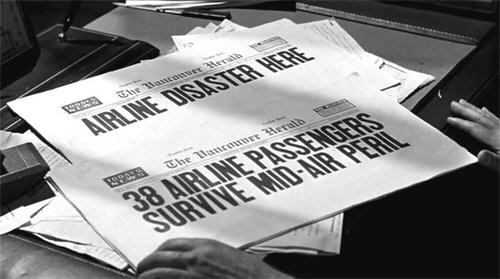
“I say – LET ’em crash!”
Outside the cockpit, Baird tells Wilson that they have to land as soon as possible. Wilson replies that – oh, surprise! – they’ve just past the point of no return, and that with the weather so bad, they’ll have to push on to Vancouver, almost four hours’ flying away. Suddenly, the plane lurches violently, provoking screams from the passengers. Wilson and Baird struggle up into the cockpit, where co-pilot Walt Stewart – who had a double serving of the fish – is slumped unconscious over his controls.
Wilson fights to regain control of the plane, while Baird hauls Stewart from his seat and onto the floor (no, he’s not wearing shorts and Nikes), so that he can examine him. He recognises the symptoms, and starts questioning Janet about the meals and their source – which turns out to be a last-minute replacement for the usual caterers. Baird starts issuing orders to Wilson, demanding that emergency medical teams and equipment be assembled in Vancouver; and it is only when he is hurrying away to see the other sick passengers that it rather belatedly occurs to Wilson that he also had fish for dinner…
The film opens up here, at least slightly, as Wilson radios 714’s situation to Calgary, from where it is relayed to Vancouver; and we begin to divide our time between the plane and the airport (and it becomes much harder not to giggle). We meet Harry Burdick, in charge of operations, who sets about clearing the skies and arranging all emergency responses. Meanwhile, up in the air, Baird is shooting Wilson up with morphine (!), to try and retard the action of the toxin. Baird then goes out into the body of the plane and explains to the passengers what’s going on. They take the news with surprising calmness and, one or two minor incidents aside, continue to behave themselves remarkably well for the duration.
Of course, that’s probably because Baird didn’t tell them they were out of coffee.

“It’s a good thing you don’t know how much he hates your guts!”
Janet is dispensing pills – emetics, although we don’t dwell on the point; not in the 1950s! – when the plane lurches again. She tries to get Wilson on the phone, but there’s no answer. She collects Baird and they hurry up front, where Wilson is succumbing to illness, but not before he manages to engage the autopilot. Clutching himself in pain, Wilson mutters that Baird has to keep him going; that only he can land the plane… But it’s no use. It is here that Baird utters that immortal line of dialogue…
Janet then slips out amongst the passengers, seeking someone with flight experience to “help with the radio”. There is a noticeable silence before Ted Stryker confesses that he flew in the war, and a significant hesitation before he allows himself to be led up into the cockpit. Once there, of course, he tries to back out – “It’s a different kind of flying – altogether!” – but Baird has him trapped, pointing out that Joey is amongst those whose lives are in imminent danger, and that they have two and a half hours at the outside to get the plane down and everyone to hospital. Left with no choice, Ted takes the controls.
Agreeing that Ellen has got to know, Baird has her brought to the cockpit, where she stares in horrified disbelief and blurts, “You can’t fly this plane!”
We get an absolutely classic 1950s moment here as Baird immediately assumes the role of Smug, Condescending Male, and lectures Ellen about her wifely duty to have faith in her husband. Ellen bites her tongue, but you can see she’s about half an inch from exploding, “Look, buster, I’ve lived eleven years with this spineless jerk – !!” It is then agreed that that they will keep the terrible secret amongst the four of them for as long as they can, with Ellen sitting in the co-pilot’s seat and taking over the radio. Between the two of them and Janet, Ted and Ellen manage to figure out the radio, and Ted gives Vancouver the news.
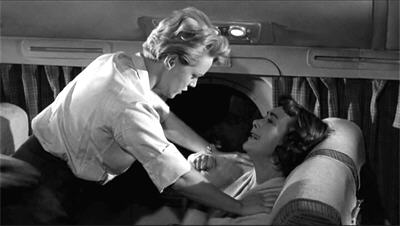

Line to the left, please, no pushing, you’ll all get a turn…
On the ground, the efficient Harry Burdick springs into action again – among other things, summoning Captain Martin Treleaven, the airline’s senior pilot. We get one of the film’s few detours here, and an odd one it is, as it turns out that Treleaven has taken his wife out for dinner and dancing. This we learn courtesy of the Treleavens’ disinterested babysitter, who can barely hear the call over the blast of the television – on which we see an obvious Elvis stand-in played by none other than John Ashley!
There’s a delay before they can find Treleaven, and up in the air, Ted Stryker is starting to sweat. (As with Richard Burton later on, during this phase of Dana Andrews’ career the sweat always looked disturbingly real.) Ted tells Ellen to start working the radio, reassuring her that he’ll be able to explain it to her and that, besides, “I’ll tell you what to say.”
(Just like always! I’d say, if this were any other 50s marriage.)
Anyway, Treleaven gets the call – and really, you’ve got to love this guy, who wears his pilot’s uniform even when romancing his wife. (I bet he makes her call him “Captain” in bed.) He walks into the control room at the airport and immediately brings everyone’s already crushed spirits to an all-time low by referring ominously to Ted’s war record and those times when, “Well – when things weren’t so good.” Honestly, it’s this guy Baird should have been lecturing! “My feeling is,” he concludes cheerily, “that when the going gets really rough upstairs tonight, Ted Stryker’s gunna fold up.”
Now, all this is singularly unhelpful, which Efficient Harry Burdick immediately points out: I mean, it’s not like they have a choice, is it? He adds that Treleaven and Stryker are going to have to put their differences aside and work together, and that Treleaven is going to have to talk Stryker right down to the ground. Treleaven gives Burdick a, How dare you take that tone with me!? look, but finally agrees to get on with it. Burdick moves to the radio to make contact with Ted, while Treleaven cadges a cigarette from one of the other control room employees…

You can’t make this stuff up, people.
And so they begin, Treleaven and Ted and Ellen. Ted turns off the autopilot, de-ices the wings, and tries some shallow turns and a climb, with Treleaven all the while harping on their airspeed. They reduce speed, and the practice with the flaps and landing gear. (There are lots of nice shots here of Ellen working the controls with her left hand, her wedding ring on clear display.)
Ted copes well with all of this, but when Treleaven insists on running through the whole routine again, he snaps, saying flatly that he’s going to give everything he’s got the first time, and that’s that. Treleaven gets snotty with him – of course – and Efficient Harry Burdick has to intervene.
The two silence their radios for a time. Ted flies on successfully for a while, but then the storm worsens and the lightning increases; and with the lightning comes the memories…
It is not until Ellen starts screaming that Ted snaps out of it, finding that their airspeed has dropped, the plane has stalled, and that they’re heading straight for the mountains… With a monumental effort, Ted manages to get the plane started again, and pulls them out of it.
Of course, Ted isn’t the only one whose nerves are at full stretch. One of the woman passengers, who’s already had one freak-out, has another here, striking and shattering the glass over what I’m assuming is the emergency door release, and shrieking, “I gotta get out of here! I’ve gotta get out of here!” She cuts her hand badly, and Tony binds it up with his handkerchief.

“I just want to tell you both – good luck! We’re all counting on you!”
Meanwhile, another passenger, who in any other film would be Panicky Idiot #1, wanders up to the cockpit and throws open the door to see what’s going on. (It isn’t just terrorists you need to guard against, it seems.) “Look!” he exclaims. “He isn’t a pilot!” There’s a shocked gasp from the others, but they’re silenced when Baird steps up and gives them the bottom line. They take it very well, considering, and pretty much do what they’re told, which is sit down and shut up; even Panicky Idiot #1, who actually looks ashamed of himself.
Meanwhile, both parties to the crisis are making the unpleasant discovery that they’ve lost radio contact. The plane’s radio was thrown off its frequency during the last panic, and it takes some time and fiddling before Ted and Ellen manage to find Vancouver again. They get themselves reorganised, and then Ellen slips out to see Joey. She comes back with the news that he’s worse, and that they’re running out of time. Ted tries to reassure her, telling that he knows that everything will be all right. Ellen gives him a thoughtful look. Over the radio, Treleaven summons Janet, giving her instructions for getting the passengers into crash position. Janet signals her understanding to Ellen, and walks off with a decisive nod.
It is one of the nicer things about this film that no-one really questions the capacity of Ellen or Janet to step up and do their parts in dealing with the crisis. Well – Baird does a bit, but that’s more a matter of him being a jerk. However, this would hardly be a proper disaster movie if it didn’t have at least one Helpless, Whimpering Female; and back in the cabin, Freak-Out Woman chooses this moment for a third fit of hysteria. Janet, though, finally has enough of her: her response is to take the woman by the shoulders and shake her violently before slapping her face. Tony then intervenes, grabbing Janet by the arm and pulling her away, before he starts shaking the woman. It’s all strangely familiar…
Down on the ground, the weather is getting worse, with the fog closing in instead of clearing. Treleaven tries to convince Ted to fly around for a while, in the hope of a parting, but Ted replies shortly that there’s no more time, and he’s coming in straight away.

“…Flight #714 now landing at Gate 9…Gate 10…Gate 11…”
“Don’t be a fool, Stryker!” responds the ever-tactful Treleaven. “You know what a landing like this means! – you more than anybody!”
Ted flinches, but puts his foot down, and the others can only go along with him. From the tower, Treleaven starts to put Ted through his pre-landing paces. With the flaps down, Ted has trouble holding altitude. Treleaven barks at him that he’s too low….which has the unfortunate side-effect of bringing on another flashback, with Ted hearing his doomed men crying out, “We’re too low! We’re too low…!” Ellen has to shake his arm to bring him out of it. Ted regains control but continues on his descent, provoking another tirade from Treleaven. Ted, however, has had enough, telling Treleaven shortly that he’s coming in right now. “I may bend your precious airplane, but I’ll bring it down!”
With that, he drops the radio and puts the gear down. It is at this point that Ellen gives him a long, long look of mingled relief and love – mostly relief – and says quietly, “I just wanted you to know – now – I’m very proud.” Ted gives her an aw-shucks smile and puts her back to work on the radio. “The gear is down, and we’re ready to land,” she reports.
“He may not be able to fly, but he’s sure got guts,” comments Efficient Harry Burdick, drawing a reluctant shrug of acquiescence from Treleaven.
And so Ted begins his approach. He comes in too low, and too fast, but he manages to put the plane down, at least on the third leap forward – only then he can’t stop it. As the plane careens wildly down the runway, he first slams on the emergency brakes, and then cuts the ignition switches. The plane lurches violently, and its landing gear collapses; and in a cacophony of screaming metal and rubber, the plane tears down the runway on its belly, skidding and jerking and spinning around while throwing off gouts of flame and sparks.
And then it stops.
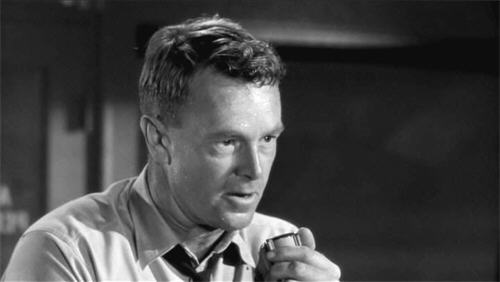
“I was never happy as a child. Christmas, Ted—what does that mean to you? For me it was a living hell. Do you know what’s it’s like to fall in the mud, and get kicked in the head by an iron boot?”
There are, as you might imagine, a few moments of incredulous silence and stillness before the passengers bolt from their seats. Baird, Joey in his arms, sticks his head into the cockpit to tell Ted that everyone’s all right, and that they’re in time to get the sick people to hospital. As Ted and Ellen move to follow him, Treleaven calls with one more gracious message: “Ted, that was probably the lousiest landing in the history of this airport! – but—”
—come on, folks: altogether now! – we all know how this one goes, right?—
“—there are some of us here, particularly me, that would like to buy you a drink and shake your hand!”
A smiling and reunited Ted and Ellen put their arms around each and walk from the cockpit. And that, my friends, is that.
It really isn’t fair, is it? By disaster movie standards, Zero Hour! is quite a taut and reined-in effort, and it is the height of injustice that so many people now have it pegged in their minds as a piece of campy nonsense. Indeed, I suppose the only up-side to the situation is the fact that a great many more people have seen the film – have made a point of seeing the film – than would have, if things had been different. Not everyone shares my peculiar predilections, after all.
And speaking of which, the late 1950s saw the release of a whole rash of aeroplane-related disaster movies, all of which I own, and none of which I’ve watched yet. (In order, you understand.) I’m very much looking forward to working my way through them, and I hope that you are too.
Too bad if you’re not, really…
Want a second opinion of Zero Hour!? Visit Jabootu’s Bad Movie Dimension.
Footnotes:
- It’s actually runway zero-nine that the plane lands on. Curiously, it is in the novelisation, too…so why was the American edition called Runway Zero-Eight?
. - Whether by joke or by accident, Zero Hour! copies both of The High And The Mighty’s two pieces of unsubtle symbolism, namely, a broken toy plane, and a lighted-up runway approach that looks like a gigantic glowing cross. I had assumed that the latter was just to acknowledge that the Duke was in charge and all was under control…but maybe that’s what lighted-up runways really looked like in the 50s?
. - Last time we dealt with this film, it prompted the unearthing of what seems to be, unfortunately, the only surviving footage from Flight Into Danger, excerpts used in a TV program on the days of live television and uploaded to YouTube…from where they have since vanished, sigh.
. - On the other hand, poking around with hope springing eternal, I have this time discovered yet another version of this story, a German TV film from 1964, Flug In Gefahr, starring Hanns Lothar as George Spencer. It is available both officially, on DVD, and free online—but alas, no subtitles. Though mind you, it’s not like I don’t know it by heart…!

And if I may be serious for just a moment:
(…surely…)
Charles Quinlivan as Efficient Harry Burdick, yet another AYCYAS!? crush.

Canadian football in the fifties would be gridiron tackle played with twelve man teams on a 110 yard (101m) field with three downs per possession.
LikeLike
“Crazy Canadian rules”, as The Simpsons would say. 😀
Thanks, that’s interesting.
The way it’s presented, this group doesn’t really seem like a football crowd at all, so it’s hard to envisage.
LikeLike
Those “crazy” rules are how United Statesian football was played before they made dozens of tweaks. So the Canadian league is the OG here.
LikeLike
I saw this movie on TV as a child and found it quite effective, and hoped to see it again someday. So I was well primed for Airplane!, …but I never actually watched it; to this day I’ve only seen the second half of it.
LikeLike
Yeah, it’s funny… I can’t remember a time when I wasn’t into disaster movies, though in pre-VCR days it was all pot luck. I don’t remember when I first saw Zero Hour! but oddly, I do remember seeing Terror In The Sky and reacting to the fact it was a remake, so I clearly had seen it.
As for Flying High!, I remember that perfectly: a Sunday matinee, the second half of a double-bill with Raiders Of The Lost Ark. That was quite an afternoon…
LikeLike